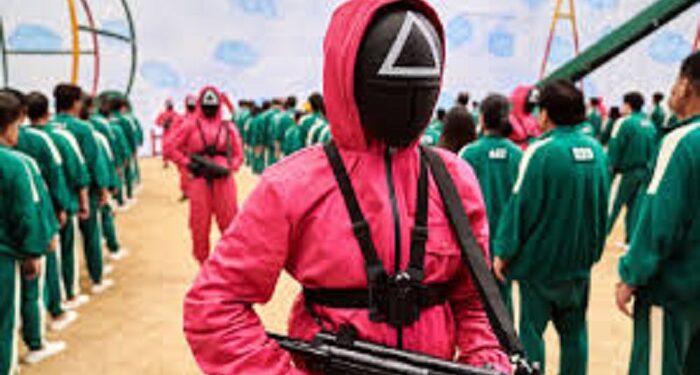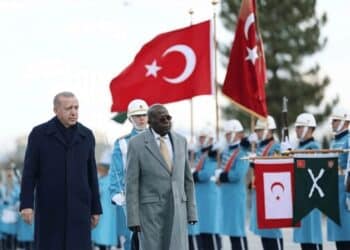By Oluwatoyin Salau-Fasalojo
Squid Game, as a 21st-century television series, is a reflection of class-based violence; a struggle between the rich and the poor in relation to the value of human life. The movie exposes the inhuman nature of mankind; however, the focus is to domesticate the movie into the African society by exposing the current tread of insecurity raving on the African soil with bloodshed.
The quest to escape from poverty has contributed vastly to the need to exploit one another, to different degrees without preference and respect to humanity. The society, represented in the television series maybe Asia, has serious relevance to any other society of the world, because of the economic dependency of human nature for survival. For the case of Africa, the game may be different but has a common thread of bloodshed. For instance, ritual killing, kidnapping, banditry and other forms of insecurities, are presently treading paths in African society. This is a result of a quest for money.

Dehumanization, exploitation and greed are serious concerns in the movie, just as the case in Africa because we can observe from the agitations of the players after the first game that human lives are valued in relation to individual economic status.
There is room for free will just as the notion of election connotes; which depicts a rivalry between the values of money versus the value for human life. At the state of decision-making as regards the continuity of the game; it is a choice between money and life, therefore making money a symbol of death. The state of indecision of some players reflects the heavy burden that lack of money has placed on the 21st-century human being.
Having witnessed the vast killing, some players choose to continue the game because of the worthlessness of their lives in relation to the lack of money. Taking for instance, what Player 212 says, “what if we leave, tell me what changes? Just as bad out there, as it is in here, goddamn it.”, while Player 322 seconded when he screams, “I got nothing out there”. This reflects the detrimental effects of societal ills on individuals, which comes in different shades making life worthless as Player 1 notes, “Out here, the torture is worse” in the second series.
Considering the objectification of human beings as a central theme of the television series; it is to be observed that all the players are treated less human because of their unpleasant financial status, and their quest to escape from the burden at all costs. Hence, the maltreatment and abuse of human beings as entertainment or for any purpose is a universal issue irrespective of the society involved.
The television series, Squid Game, also reflects the mental configuration of the human mind, in reference to emotion versus logic. The consistent conflict between an emotional and logical outburst of the human mind runs throughout the decision making of each character with the same result of logic winning over emotion. Every player, involved in the game, makes decisions based on logic with the undertone of emotion, although the sentimental influence of emotion does not have a place in the game, just as the society of today.
Money, as a fundamental thematic preoccupation, serves as a measure to determine the true nature of human beings in the face of poverty and inequality. The evil, exhibited against mankind in the television series, connotes the level at which man can be desperate at the detriment of others, irrespective of the connection. For an instance, the case of the Frontman shooting his brother shows respect to duty over blood, just as in relation to logic over emotion.
It is to be observed that money reveals another aspect of the nature of man, as regards money in the face of prosperity and excess. Man becomes a tool or object of excitement for the rich to the detriment of being poor. The objectification and dehumanization reflected in the series give an insight into the psychological conflict between the rich and poor in every given society. Taken, for instance, the maltreatment of factory workers, popularly known as labour, in the third world countries by those with the capital, is a pure reflection of contemporary slavery. All for the quest to survive, it has become a serious display of exploitations and dehumanization at a very high degree, making the state of security questionable. This race is a result of the extreme rate of poverty that has bedevilled the common man on the street of Africa, while on the other hand, we are
The fourth episode of the television series, Stick to a Team, reflects the need to be in a group in order to survive, this serves as a redefinition of self in relation to others, more so there is a price to pay especially for the female gender. The admittance to the team reflects another form of conflict, which is a gender imbalance. This shows another form of selfishness and greed as the competition heightened, however the need to be in a group become imperative to survival, despite the awareness of self over others.
The place of the female gender calls for attention, especially in a society where physical strength determines survival. The representation of the female gender as a weaker being in comparison to the male gender denies them the true respect humanity demands, despite the fact, the game gives both gender equal opportunities. However, it is also to be observed that there are more men than women, involved in the game, which shows gender imbalance because what could have become of the series if there were more women than men?
Sex, as an emotional attachment and thematic concern, is offered by Player 212 to Player101 in order to secure her safety as the struggles for survival becomes intense. However, the concept of sex as a shield has no regard as an emphasis on self over others become paramount, for an instance, in the following game Player 101, as the group head, denies Player 212 entry in the group claiming Player 212 is taking advantage of him, while on the other hand, Player 212 sees him as protector and confident, but later calls him a betrayer. This reflects the notion of sex in the 21st century means nothing, because they both betray each other.
Squid Game, as a reflection of modern-day slavery, shows the notion of free will but in reality, the players are left with no other option. This, by implication, shows captivity of a kind; which is financial bondage caused by several factors that man has no control over as presented in the television series. All the players share in common the quest to emancipate from the shackles of poverty at all costs; hence the need to be moral and rational becomes a mirage as lack of money means the death of a kind. The disclaimer of physical rights signed by the main character prior to the game is a perfect reflection of the black market, where human parts are being sold without consent. This reveals the societal low degree of respect to humanity, especially when the victim is poor. This portrays in reality that the value of human life depends on the concept of class; rich or poor. For an instance, Player 001’s description of a poor fellow in the concluding episode as “…that disgusting, stinking drunk, a little piece of trash,” shows the true nature of man in the treatment of others, considering his question, “is humanity still good?”.










